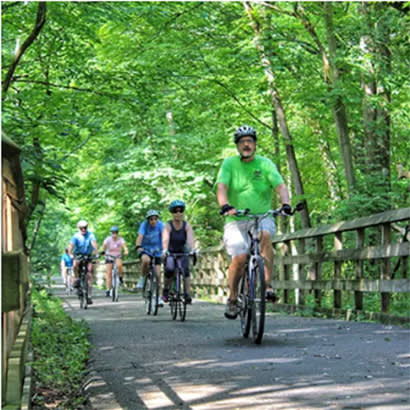
For an enhanced digital experience, read this story in the ezine.
Parks and public open spaces promote physical activity, improve mental well-being and foster social connections. Parks provide access to low-cost or no-cost physical activities, like walking, hiking and biking, which help prevent increasingly common health conditions, such as obesity, anxiety, cardiovascular disease and diabetes. Unfortunately, not every person lives within walking or rolling distance of a park. The access gap not only prevents community members from enjoying all that parks offer, but also may lead to inequitable health disparities.
In prior Research columns, we celebrated the work NRPA has supported with the Urban Institute, which has been developing resources that help professionals and advocates use economics to make a health-based case for parks. The initiative included collaboration with an advisory committee of park and recreation professionals and health and equity experts to create an adaptable and practical tool that will provide an economic value of the health impacts of parks. NRPA-funded efforts with the Urban Institute resulted in the first two resources:
- The Health Benefits of Parks and Their Economic Impacts: A Review of the Literature, which examines academic and nongovernmental organization research findings that show the benefits of parks and open spaces across four dimensions of health — physical, mental, social and environmental — and the economic impacts.
- A Framework for Assessing Equitable Health Outcomes of Parks, which lays out how parks promote greater well-being, focusing on demonstrating the economic value of these benefits. The framework follows five steps: (1) identify park characteristics, (2) examine who has access, (3) select and measure health outcomes, (4) estimate economic benefits, and (5) drive equity through action steps.
The latest resource informed by resources with the Urban Institute funded by NRPA is The Economic Value of Parks’ Health & Wellness Benefits: Narrowing Park Access Inequity. Released earlier this fall, this online tool provides park and recreation professionals and advocates with an easy-to-understand method for communicating the economic benefits that can result from eliminating inequitable park access and the associated improved health outcomes. The tool combines publicly available data (including that from the Trust for Public Land’s ParkServe) with a straightforward methodology.
As a result, you can estimate the annual health benefits in dollars should a city or town ensure every community member lives within walking or rolling distance of a park or other public open space. These data are part of the robust case for greater and more sustainable park and recreation funding. The tool has data from more than 11,000 communities across the United States.
The resource is easy to use. Simply enter your city or town name into the tool to learn:
- The total percentage of residents residing within a 10-minute walk of a park
- The percentage of residents residing within a 10-minute walk of a park, broken down by race and ethnicity
- The number of residents who do not have access to a park within a 10-minute walk
- The reduced annual healthcare expenses should the city or town ensure that every resident has walkable access to a park
You can turn the findings into an infographic that you can include in a presentation or post on your agency’s website. In addition, NRPA developed a communication guide to help you craft your community’s park and recreation story.
The new online tool, combined with the reports, provides data from a health and wellness perspective, demonstrating that parks and recreation is essential. Combined with NRPA’s The Economic Value of Parks reports and Bureau of Economic Analysis national studies on the outdoor recreation economy, park and recreation professionals and advocates have a wealth of data that make the case for greater and more sustainable funding. Share with us how you are using these resources to support parks and recreation.
Melissa May is Senior Research Manager at NRPA. Michele White is Senior Program Manager of Conservation at NRPA.


